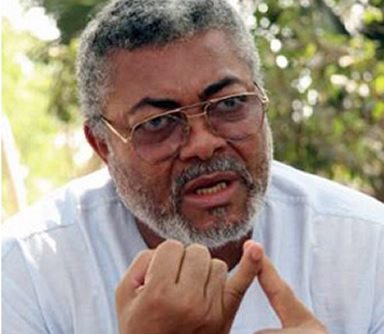Strengthen social accountability to ensure national development – Rawlings

Former President, Jerry John Rawlings, has called for the strengthening of social accountability structures both nationally and internationally, in order to achieve desired developmental goals.
He said the current challenges being encountered in all spheres towards the achievement of the various objectives and goals especially in such areas as health, education, sanitation, finance and good governance, could be attributed to the flexibilities in social accountability mechanisms across board.
He cited how the laxity has led to the failure to hold persons accountable for wrong doings and for neglecting their responsibilities to their duties and punishing them accordingly, which therefore, has led to the widespread of replications of these negative and undisciplined behaviours, resulting in the failure to achieve national aspirations.
Flt Lt. J. J Rawlings, said there was currently a massive decline in both national and global morality, where all the negative actions, behaviours and practices that used to be abhorred by society in past years, were being introduced, perpetuated and worshipped especially by those in authority, to destroy the very institutions which they themselves were to protect.
The Former President Rawlings who made the observations at a dinner with the UNFPA Regional Management Team from West and Central Africa who were currently attending a five-day annual meeting in Accra, said there was a huge challenge to nations to work hard towards addressing the issues through strengthened collaboration, monitoring and evaluation systems.
His interaction with the Team also brought to bear, the need to double efforts riding on existing strategies and programmes to achieve targeted outcomes in areas such as Reproductive, Maternal and Child Health (RMCH), deducing maternal and new-born deaths and improved sanitation both in the region and globally.
He said persons entrusted with the management of systems to ensure the achievement of targeted interventions must be constantly monitored to ensure that they worked to achieve value for money.
Flt. Lt. Rawlings said there was the need to intensify advocacy on Family Planning and other key interventions aimed at reducing maternal mortality and newborn deaths, and asked that young people be brought onto the table to partake in discussions that affected their health, so that they could make informed decisions and choices.
He said society must be held accountable for the reduction in the current poor sanitation levels in many developing countries, arguing that a person did not need formal education to be able to reason well when it come to the issue or what was wrong or right.
He said what was being witnessed currently was just a higher form or social indiscipline, in an era of heightened knowledge and education, which needed to be urgently addressed by governments and persons in authority to bring about law and order.
He said the older generation owed it a duty to shape a stronger legacy for the future, and urged traditional authorities to rise up above their normal responsibilities to support governments and institutions to address the social challenges, most of which could be attributed to foreign cultural influences.
The placement of too much emphasis on the older generation was a mistake as this could adversely affect the country’s future; therefore their engagement in national discourse was urgent and key.
He said the failure to urgently address these lapses, could lead to conflicts, terrorism, failures in culture and traditions, widespread corruption, poverty, diseases, as well as increase in maternal and child deaths, and countries would miss achieving the UN’s Sustainable Development Goals.
He urged the UNFPA to support investment in young people to build their capacities as well as that of institutions for the development of the continent.
Mr Mabingue Ngom, the Regional Director for West and Central Africa of the UNFPA, on his part said the high population growth rate, made the economies of developing countries very fragile because they lacked the capacity to provide the needed basic services and jobs to ensure productivity.
Mr Nyiyi Ojuolape, Ghana’s Resident Representative of the UNFPA, thanked the Former President for accepting to share his thoughts on social accountability and how to deal with the rising issues.
He said the wealth of wisdom shared would be forever cherished by all members of the Team, and it would help direct them in their discussions and focus as to areas to invest and support.
Source: GNA
